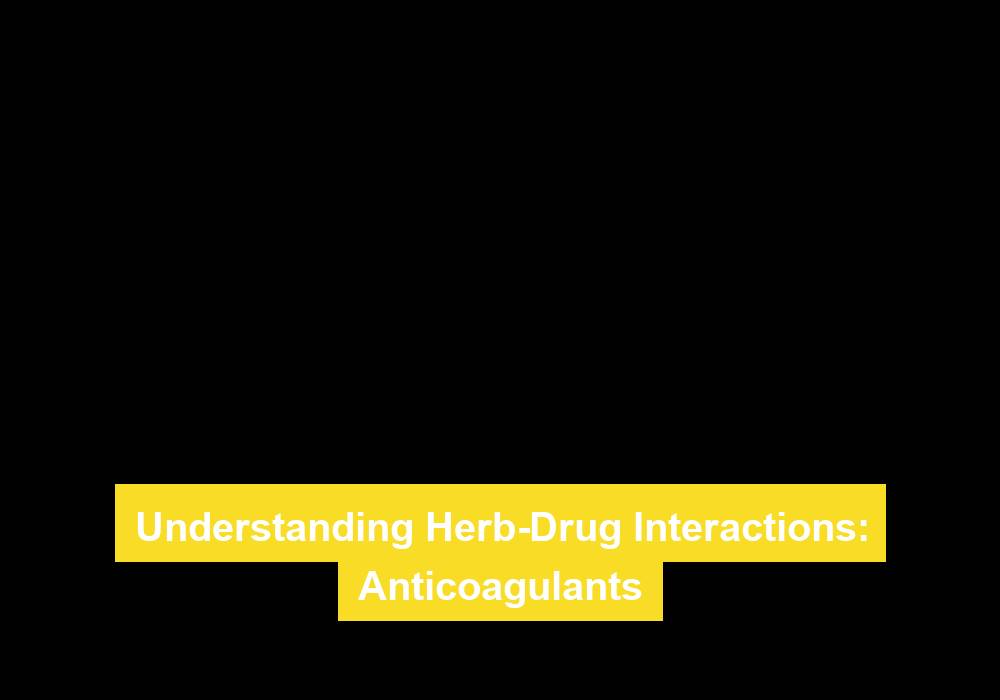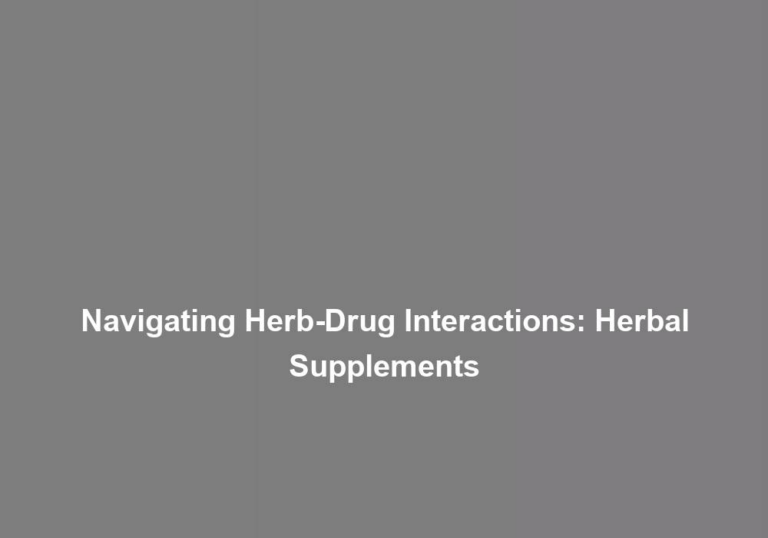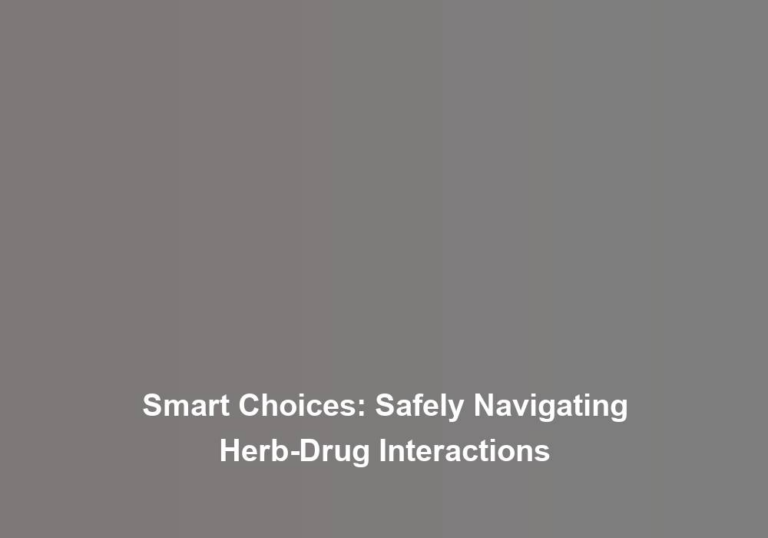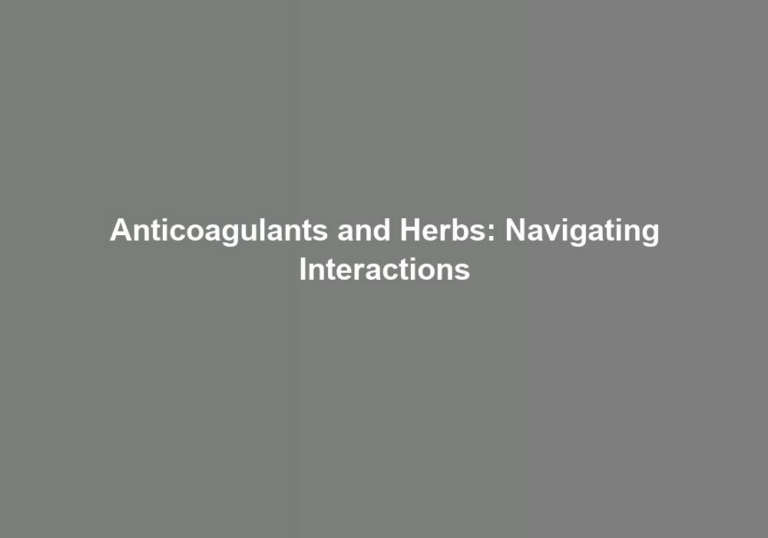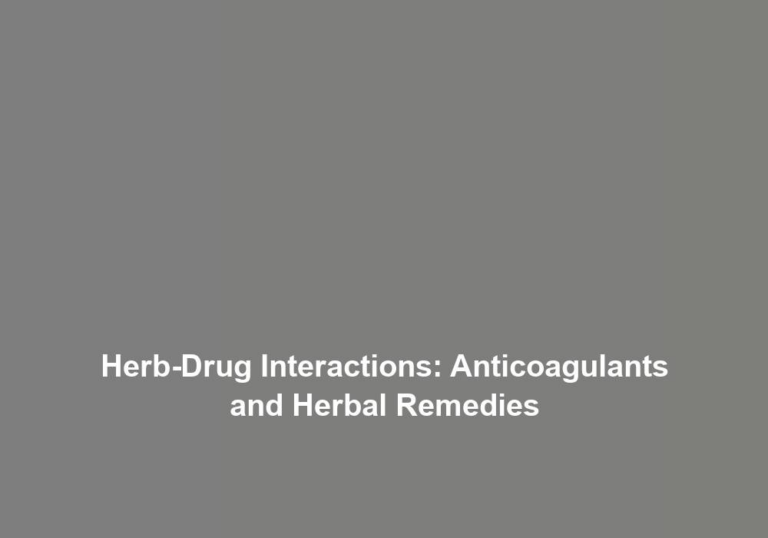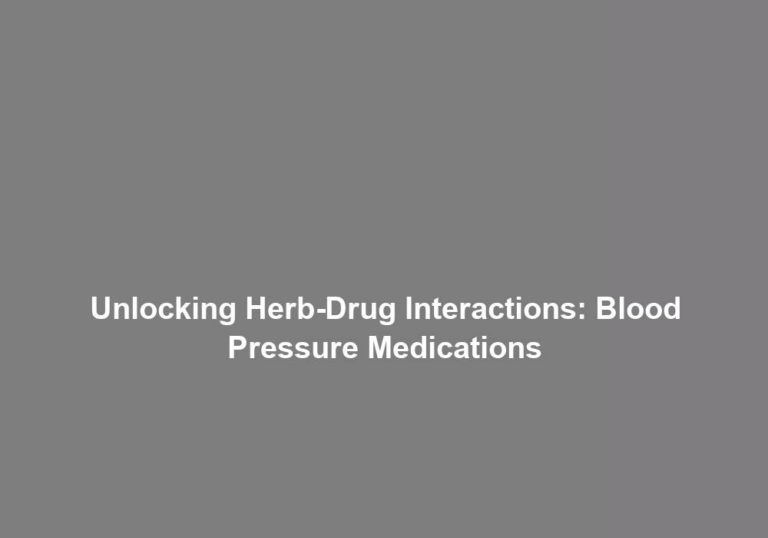Understanding Herb-Drug Interactions: Anticoagulants
You may think that managing your medication regime is already complex enough, but when it comes to anticoagulants, the stakes are even higher. The interaction between these life-saving drugs and certain herbs can have serious implications for your health. Understanding these interactions is crucial for your well-being, and knowing how to navigate them can make all the difference in your treatment.
Importance of Understanding Interactions
Understanding interactions between herbs and drugs is crucial for healthcare professionals and patients to ensure safe and effective treatment outcomes. When it comes to anticoagulants, the implications of herb-drug interactions can be particularly significant. Patients on anticoagulant therapy need to be educated about the potential interactions between their medication and various herbs. Certain herbs, such as ginkgo biloba, garlic, and ginger, can interact with anticoagulants, either by enhancing or inhibiting their effects. This can lead to an increased risk of bleeding or decreased anticoagulant activity, potentially compromising the patientG??s treatment.
Patient education regarding herb-drug interactions is paramount. Patients must be made aware of the potential risks associated with combining anticoagulants and certain herbs. They should be encouraged to disclose any herbal supplements they are taking to their healthcare providers to receive appropriate guidance. Healthcare professionals play a vital role in educating patients about the impact of herb-drug interactions on anticoagulant therapy. Understanding the implications of these interactions allows healthcare providers to make informed decisions when prescribing anticoagulants, ultimately ensuring the safety and efficacy of the treatment.
Common Herbs With Anticoagulant Effects
Patients on anticoagulant therapy need to be aware of the potential interactions between their medication and various herbs, as certain herbs can either enhance or inhibit the effects of anticoagulants, thereby affecting the safety and efficacy of their treatment. Common herbs with anticoagulant effects include garlic, ginger, ginkgo biloba, and turmeric. These herbs have been found to possess potential benefits for cardiovascular health and have been used as alternative therapies by individuals seeking to manage their conditions through natural remedies.
Garlic, a popular herb used in cooking, contains compounds that may have anticoagulant properties. Allicin, a key component of garlic, has been shown to have antiplatelet effects, which could potentially interfere with the action of anticoagulant medications. Similarly, ginger, often used for its anti-inflammatory properties, contains gingerol and other bioactive compounds that may also have anticoagulant effects. Ginkgo biloba, derived from the leaves of the ginkgo tree, is another herb known for its potential anticoagulant properties. It contains flavonoids and terpenoids that may affect platelet aggregation and blood clotting. Turmeric, a spice commonly used in traditional medicine, contains curcumin, which has been investigated for its potential anticoagulant and antiplatelet effects.
While these herbs may offer potential benefits for cardiovascular health and serve as alternative therapies, patients on anticoagulant therapy should exercise caution when incorporating them into their regimen. It is essential for individuals to consult with their healthcare providers before using these herbs, as they have the potential to interact with anticoagulant medications, leading to adverse effects or reduced efficacy of the treatment.
Mechanisms of Herb-Drug Interactions
When considering herb-drug interactions, it is important to understand the mechanisms through which herbs can impact the efficacy and safety of pharmaceutical medications. One key aspect to consider is the pharmacokinetic considerations, which revolve around how the body processes drugs. Herbs can influence the absorption, distribution, metabolism, and excretion of pharmaceuticals, ultimately affecting their blood levels and therapeutic effects. For example, St.-?JohnG??s wort is known to induce certain liver enzymes, which can accelerate the breakdown of drugs like warfarin, leading to reduced anticoagulant effects and potentially increasing the risk of blood clots. This has significant clinical implications as it may result in the need for higher doses of anticoagulants or closer monitoring of the patientG??s coagulation status.
Moreover, herb-drug interactions can also occur at the level of drug transporters and drug-metabolizing enzymes. Certain herbs may inhibit or induce these metabolic pathways, affecting the bioavailability and clearance of pharmaceuticals. For instance, ginger has been shown to inhibit platelet aggregation, and when taken concomitantly with anticoagulant medications, it can potentiate the anticoagulant effects, leading to an increased risk of bleeding. Understanding these mechanisms is crucial for healthcare providers to make informed decisions when managing patients on anticoagulant therapy.
Potential Risks and Complications
You should consider the potential risks and complications associated with herb-drug interactions, particularly when it comes to anticoagulants. Bleeding risk assessment and monitoring coagulation status are crucial aspects to consider in managing the potential risks. It is important to be diligent in assessing and managing these risks to ensure the safety and efficacy of anticoagulant therapy.
Bleeding Risk Assessment
Assessing the potential risks and complications associated with bleeding is essential when considering herb-drug interactions with anticoagulants. Bleeding risk assessment involves a comprehensive evaluation of various factors to ensure the safety and well-being of individuals on anticoagulant therapy. When assessing bleeding risk, consider the following:
- Coagulation Profile: Regular monitoring of coagulation parameters such as prothrombin time (PT) and international normalized ratio (INR) is crucial to assess the risk of bleeding.
- Medication History: Evaluate the use of other medications, including over-the-counter supplements and herbal remedies, which may interact with anticoagulants and increase bleeding risk.
- Medical History: Assess the individualG??s medical history for conditions such as gastrointestinal ulcers, liver disease, or renal impairment, which may heighten the risk of bleeding.
- Lifestyle Factors: Consider lifestyle choices, such as alcohol consumption and dietary habits, that can impact bleeding risk.
Monitoring Coagulation Status
Evaluating the potential risks and complications associated with bleeding in individuals on anticoagulant therapy necessitates a thorough understanding of monitoring coagulation status, particularly with regard to potential interactions with herbal remedies and supplements. Coagulation testing plays a crucial role in managing anticoagulant therapy. Herbal remedies and supplements can interfere with the accurate assessment of coagulation status, affecting the interpretation of results. Certain herbal supplements may directly impact clotting factors, leading to fluctuations in coagulation status and increasing the risk of bleeding complications. It is essential for healthcare providers to be aware of the potential effects of herbal remedies on coagulation testing, as this can have significant implications for the management of anticoagulant therapy. Close monitoring and clear communication between patients and healthcare providers are vital in ensuring the safe and effective use of anticoagulants alongside herbal supplements.
Managing Herb-Drug Interactions
When managing herb-drug interactions with anticoagulants, itG??s crucial to take safety precautions to minimize potential risks. Communicate openly and regularly with your healthcare provider about the use of herbs and supplements alongside anticoagulant medication. Additionally, monitoring for adverse effects is essential to ensure the effectiveness and safety of your anticoagulant therapy.
Safety Precautions for Interactions
To effectively manage herb-drug interactions, it is crucial to carefully consider potential risks and take proactive measures to minimize adverse effects. When dealing with anticoagulants and herb-drug interactions, safety precautions are essential to ensure optimal patient care. Consider the following safety measures:
- Dietary Restrictions: Advise patients to maintain a consistent intake of vitamin K-rich foods to prevent fluctuations in anticoagulant effectiveness.
- Patient Counseling: Emphasize the importance of open communication regarding herbal supplement use, ensuring patients disclose all products they are consuming.
- Alternative Therapies: Explore non-pharmacological approaches, such as acupuncture or massage therapy, as potential alternatives to herbal supplements.
- Herbal Supplements: Educate patients about the potential interactions between specific herbal supplements and anticoagulants, emphasizing the need for caution and medical consultation before use.
Communication With Healthcare Provider
In managing herb-drug interactions, it is crucial to engage in open and transparent communication with your healthcare provider regarding any herbal supplements or alternative therapies you are considering or currently using. Patient engagement is essential for ensuring the safe and effective use of anticoagulants and herbal remedies. ItG??s important to initiate healthcare collaboration by informing your healthcare provider about all the herbs, vitamins, and supplements you are taking, as they can potentially interact with anticoagulant medications. This collaboration allows for a thorough evaluation of potential interactions and helps in making well-informed decisions about your treatment plan. By openly discussing herbal supplement use with your healthcare provider, you contribute to a shared decision-making process and ensure that your treatment is tailored to your specific healthcare needs.
Monitoring for Adverse Effects
Engaging in diligent monitoring for potential adverse effects is a critical component of managing herb-drug interactions, ensuring the safety and efficacy of your treatment plan. It is essential to collaborate closely with your healthcare provider and maintain open communication about any changes in your health status. Regularly assess for adverse effects by closely monitoring your symptoms and any changes in your overall well-being. Additionally, keep track of any new medications or supplements you may introduce and promptly report any unusual reactions to your healthcare provider. Understanding the potential adverse effects and conducting regular risk assessments will empower you to take an active role in safeguarding your health while undergoing anticoagulant therapy.
- Monitor for any unusual bruising or bleeding
- Keep track of changes in your energy levels and overall vitality
- Stay vigilant for signs of gastrointestinal disturbances
- Report any unexplained changes in your health to your healthcare provider
Patient Education and Communication
Patients taking anticoagulants should be educated about potential herb-drug interactions to ensure their understanding and safety. Patient engagement is crucial in managing their medication effectively. Providing patients with detailed information about potential interactions between anticoagulants and herbs empowers them to make informed decisions and actively participate in their treatment plan. Informed consent is essential, and patients should be aware of the potential risks associated with herb-drug interactions, especially when it comes to anticoagulants.
| Herb | Potential Interaction |
|---|---|
| Garlic | May increase the risk of bleeding when taken with anticoagulants such as warfarin |
| Ginkgo Biloba | Can potentiate the effects of anticoagulants, leading to an increased risk of bleeding |
| Ginger | May enhance the anticoagulant effects of medications, potentially increasing the risk of bleeding |
| Turmeric | Can interact with anticoagulants, increasing the risk of bleeding |
Understanding the potential interactions between anticoagulants and herbs is essential for patient safety. By educating patients about these interactions, healthcare providers can foster a sense of belonging and trust with their patients. Patients who feel well-informed and supported are more likely to adhere to their treatment plans and actively engage in discussions about their health. Open communication and comprehensive education regarding herb-drug interactions can strengthen the patient-provider relationship and ultimately improve patient outcomes.
Conclusion
In conclusion, understanding herb-drug interactions is essential for safe and effective treatment with anticoagulants. Just as a delicate dance requires precise steps, the interaction between herbs and drugs must be carefully managed to avoid potential risks and complications. By educating patients and communicating the potential dangers, healthcare providers can help ensure that the balance between herb and drug therapies remains steady and secure.

